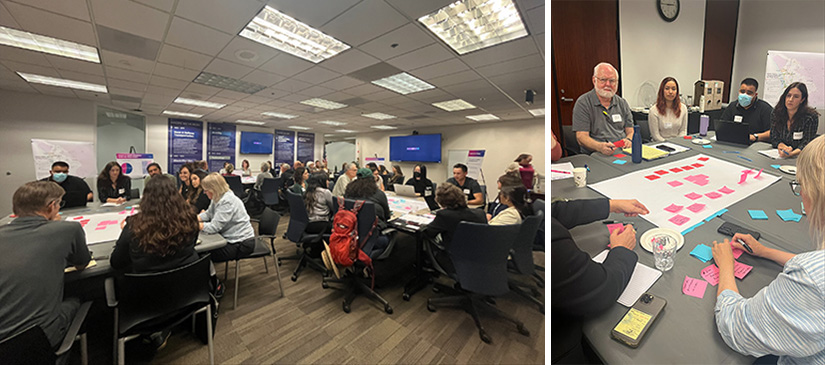Peer Learning Helps San Diego Center Community Voices in Clean Energy Plans
Participating in C2C Cohort Gives the San Diego Association of Governments New Tools To Enhance Community Participation

The San Diego Association of Governments (SANDAG) has ambitious plans to make local progress toward California's goal of carbon neutrality by 2045. While they have experience in the clean energy project planning process, SANDAG has sought to continually improve their methods for engaging with communities around those projects.
Looking to enhance community participation and build capacity within their organization, SANDAG joined a Clean Energy to Communities (C2C) peer-learning cohort focused on integrating community voices into clean energy planning and development. Their cohort experience is now helping them codevelop clean energy programs with those they serve.
"The cohort opened doors to new ways of community engagement for us," said Samaya Elder, a regional planner for SANDAG.
SANDAG was one of 15 organizations to participate in the cohort from July to December 2023. Funded by the U.S. Department of Energy and managed by the National Renewable Energy Laboratory (NREL) with support from the World Resources Institute, C2C cohorts consist of small groups of representatives from local and regional governments, electric utilities, or community-based organizations. The groups meet regularly over six months to learn from each other and national laboratory experts in a collaborative environment centered on a clean energy topic.
Elder entered the cohort program to enhance SANDAG's community engagement for two projects. One is their Priority Climate Action Plan, which will identify near-term actions and policies that can be implemented quickly to reduce air pollution. The other is an incentive program to support low-income households in purchasing or leasing zero-emission vehicles.
SANDAG recognized both projects' need to include community voices front and center. C2C cohorts gave them insightful feedback from peers and expert guidance in best practices to facilitate community engagement efforts for these projects, including supporting SANDAG in developing two workshops to draft their Priority Climate Action Plan. These SANDAG workshops included a mix of staff from local governments, tribes, and a wide variety of community groups and nonprofits, featuring breakout group discussions with participants to identify what the plan should focus on.
"In the past, I think we might have just presented initial priorities to a group of stakeholders and asked for their thoughts," Elder said. "But this was much more collaborative, with us instead asking 'What should we prioritize?' from the very beginning."
Since her participation, Elder is considered her team's "go-to" for community engagement efforts, passing along what she has learned in best practices to her colleagues.
"We don't have an outside consultant or third-party help for our Priority Climate Action Plan," Elder said. "We developed the outreach and engagement strategy in-house with a lot of the learnings that I got from this cohort."
Elder received one-on-one technical assistance during the cohort, and her conversations with experts allowed her to dive further into the issues she was most interested in.
"The dedicated time that cohort participants spend with experts can complement the peer engagement," said Lauren Reichelt, NREL program manager for the peer-learning cohorts. "They can explore options and gather best practices and lessons learned during group sessions, and then an expert can help them take those learnings and translate them into their own specific context."
Elder appreciated how the cohort dove into how to navigate difficult conversations. Other cohort participants could provide concrete examples from their personal experiences, while experts gave interpersonal tips and tools for those discussions within communities and highlighted the importance of transparency in the process.
"It was nice to be vulnerable with the group and talk about some of the similar challenges that we had faced," Elder said. "Despite the challenges, we all agreed that community engagement work is important."
Moving forward, SANDAG will continue to take a more active role in community engagement for clean energy projects, including planning focus groups for the zero-emission vehicle program in this month. These groups will solicit community feedback on how to develop a program that meets their needs.
"Communities are at the core of C2C," Reichelt said. "All of our clean energy cohorts aim to provide participants with the skills and knowledge to move their ideas from ambition to execution through a community-driven approach."
Apply To Join C2C Peer-Learning Cohorts
C2C connects community-based groups, local governments, utilities, and other organizations with national laboratory experts to close the gaps between communities' clean energy ambitions and real-world deployment. The technical assistance offered through C2C can offer meaningful insights around clean energy decision-making to help communities achieve resilient clean energy systems that embody local and regional priorities.
Peer-learning cohorts are one offering of the C2C program. Cohorts of approximately 15 communities convene regularly for approximately six months to exchange strategies and best practices, learn in a collaborative environment, and workshop policy or program proposals, action plans, or strategies to overcome challenges around a common clean energy transition topic.
Learn more about C2C peer-learning cohorts.
This article has been updated to reflect an editorial change made after its original publication.
Last Updated May 28, 2025
